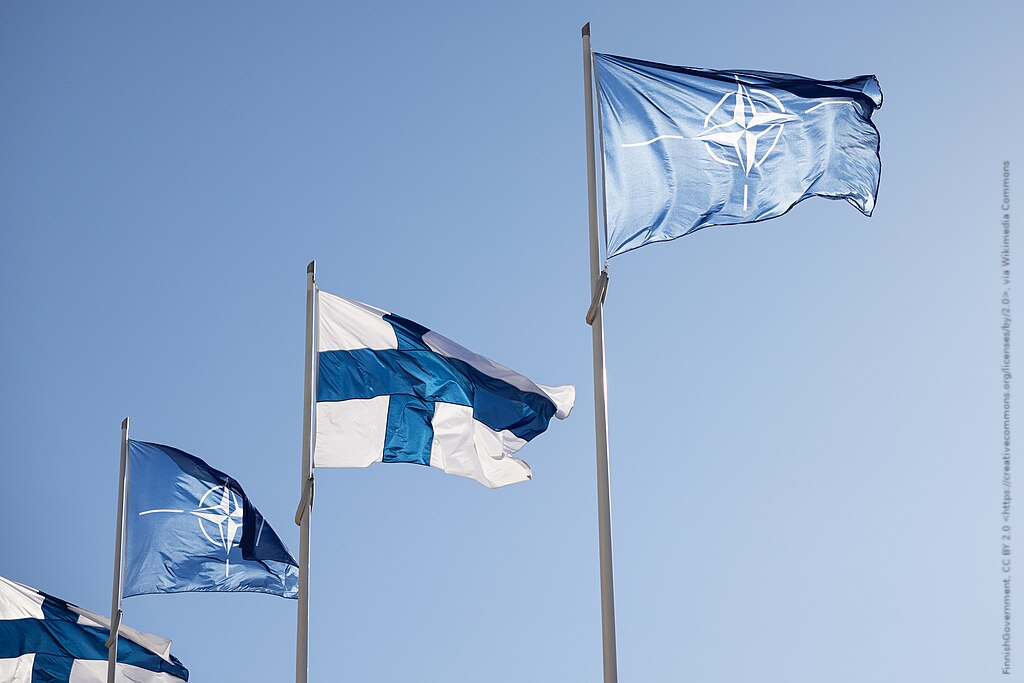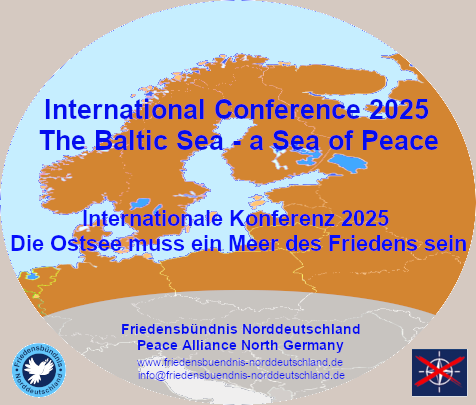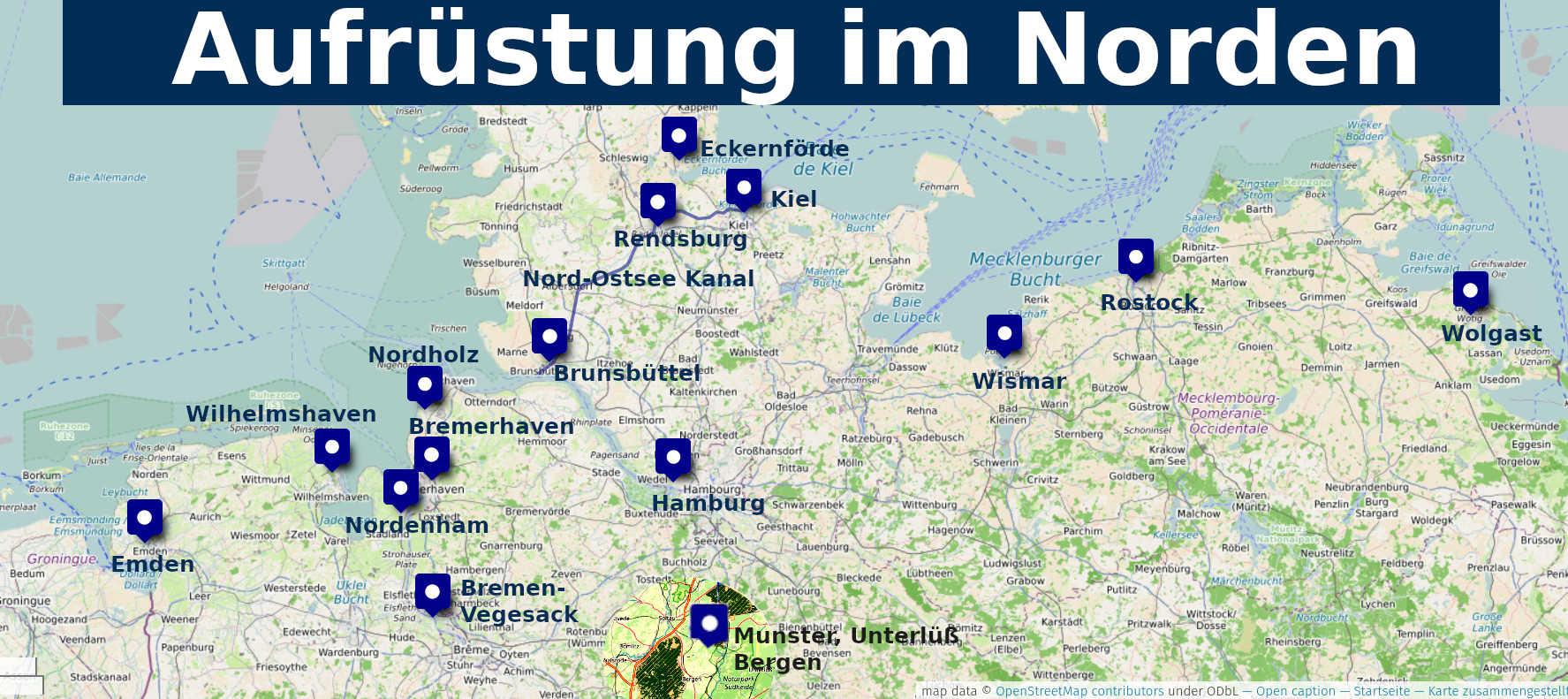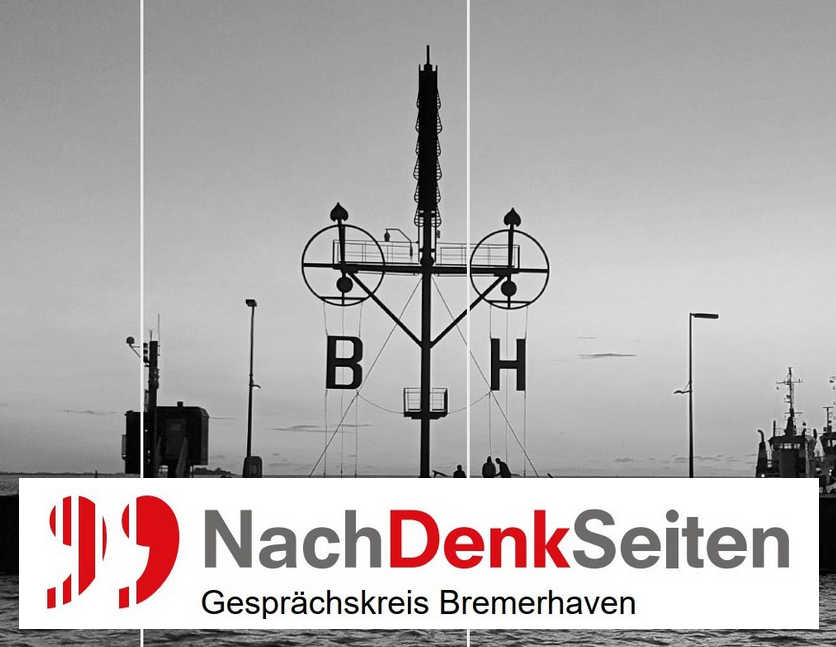 Military measures against Russia “to protect the critical underwater structure” will be decided at the summit of NATO member states in Helsinki, January 14 to 15, 2025. Sweden has announced up to 14 ships and boats and an aircraft for this purpose. Germany sends minehunters from Kiel.
Military measures against Russia “to protect the critical underwater structure” will be decided at the summit of NATO member states in Helsinki, January 14 to 15, 2025. Sweden has announced up to 14 ships and boats and an aircraft for this purpose. Germany sends minehunters from Kiel.
The Peace Alliance Northern Germany resolutely opposes the further militarization of our Baltic Sea by NATO, NATO's disregard for international maritime law and NATO's increasingly blatant threats against Russia, traditionally our most important energy supplier. Instead of an embargo policy that violates international law, we need long-term, contractually secured energy supplies at the most favorable price. The PCK refinery in Schwedt (close to the polish border in Germany / Brandenburg) must once again be supplied with Russian pipeline-oil. All gas pipelines from Russia must be put back into operation.
 We remind you of what the German government and the media want to suppress: The three Nord Stream pipelines were blown up on the orders of US President Biden. He publicly announced it on February 7, 2022 in the presence of the duped (and smiling?) German Chancellor in Washington. This was an act of war against our elementary energy supply and - together with the economic sanctions against Russia in violation of international law - has boomeranged into the downfall of the German economy.
We remind you of what the German government and the media want to suppress: The three Nord Stream pipelines were blown up on the orders of US President Biden. He publicly announced it on February 7, 2022 in the presence of the duped (and smiling?) German Chancellor in Washington. This was an act of war against our elementary energy supply and - together with the economic sanctions against Russia in violation of international law - has boomeranged into the downfall of the German economy.
The demolition was carried out by the CIA with the support of some European NATO “allies”. According to Seymour Hersh, a secret commando of the US Navy used the NATO naval maneuver Baltops 2022 in the Baltic Sea (near Bornholm) as a cover to plant the explosive charges at a depth of 75-80 meters. Divers need decompression chambers for this depth. During Baltops 2022, mine countermeasures were practiced with divers and UUVs (unmanned underwater vehicles). Participating US ships such as the small “aircraft carrier” USS Kearsarge (257 meters) and USS Gunstone Hall (190 meters) were both capable of carrying a mini-submarine that would have been useful for deploying explosives at such a depth. Sonar receivers were attached to the explosive charges, which were then detonated by a dropped sonar buoy in Sept. 2022. There are indications that a US aircraft was used for this purpose, which took off from the German military airfield in Nordholz (near Cuxhafen) and then switched off the transponder.
DOUBLE PLAY: NATO now wants to use its warships to control (and capture?) merchant ships coming from Russia in international waters in the Baltic Sea. On December 26, 2024, the Finnish coast guard boarded the tanker “Eagle S”, loaded with crude oil from a Russian port, on its way to Port Said in Egypt. The Georgian and Indian crew were prevented from leaving by the Finnish authorities. They allegedly damaged the “EstLink 2” power cable running between Estonia and Finland with the ship's anchor. The 20-year-old tanker is sailing for a company registered in the United Arab Emirates under the flag of the Cook Islands. NATO is thus launching a new maritime war against Russia.
As the austrian historian Hannes Hofbauer, author of a recently published book on the economic war against Russia, describes in detail in the "Nachdenkseiten", “ten years ago, the same tanker - then under a different name - destroyed a connecting cable to a terminal off the Chilean coast, which led to the spillage of a large quantity of crude oil. In March 2024, several submarine cables in the Red Sea were destroyed by the sinking British freighter Rubymar, which severely impaired digital data transfer. At the same time, a number of undersea fiber optic cables off the west coast of Africa failed without the causes being known.
Damage to submarine cables is therefore not uncommon, in contrast to the capture of ships, especially in the Baltic Sea. The towing of the “Eagle S” to the Finnish anchorage at Svartbäck by state bodies is an extremely unusual occurrence.” Incidentally, Russia can look back on 550 years of history in the dispute over open sea access.
The perpetrators of the so-called “Russian shadow fleet” are EU politicians, starting with their 6th sanctions package, which came into force in December 2022. In this package, the EU Commission decided on 3 June 2022 - as always without consulting the national parliaments - to ban “the direct or indirect purchase, import or transfer to Member States of crude oil and certain petroleum products originating in or exported from Russia, as well as a ban on the insurance or reinsurance of the transport of these goods by sea to third countries.” The Russian response to the Western oil price cap was not long in coming. Greek and other shipping companies were just waiting to fill their tankers with Russian oil under all kinds of colorful flags, either directly in the ports of the Baltic Sea or by pumping the oil on the high seas. In just a few weeks, this has resulted in a shadow fleet for crude oil comprising 600 freighters. This corresponds to around a quarter of the world's available capacity.
The latest NATO idea probably amounts to checking the insurance documents of all tankers leaving Russian ports. As a direct consequence of the EU and US sanctions, these ships do not carry Western insurance documents, but are generally insured by Central Asian companies. For a flag state that recognizes such insurance, this satisfies maritime law. It is precisely this maritime law that the European Union now wants to undermine.
On May 5, 2024, the Peace Alliance Northern Germany demonstrated in Rostock against the NATO tank shipment in the port of Rostock with destination Lithuania, near the Russian border at Kalinigrad. On October 21, 2024, we demonstrated again, directly in front of the Hanseatic barracks in Rostock. There, German Defense Minister Boris Pistorius - in breach of the Two Plus Four Treaty of 1990 - opened the new regional NATO naval headquarters, which - according to the press release from Helsinki - is now to assume a coordinating function for NATO: “We welcome the efforts of the allies to deploy additional assets at sea, in the air, on land and under water to improve vigilance and deterrence. The CTF Baltic staff in Rostock has been activated and coordinates the Alliance's ships in the Baltic Sea.” (Point 4 of the joint PM in Helsinki) It was decided to “monitor ships, including checking their insurance certificates”. This is against the background, that all these ships sail with insurance certificates recognized by international maritime law, just not the ones the EU "wishes".
Already last year, from December 2 to 15, 2024, 2,000 soldiers from NATO countries practiced a blockade of the Gulf of Finland. The obvious aim of the operations, known as “Pikne” (“Lightning”), was to control the departure of ships from St. Petersburg, Kronstadt and Ust-Luga or, in an emergency, to prevent them from leaving. NATO already sees this emergency as a given in connection with the oil shadow fleet.
Let us stop the US-led NATO's escalation of war in the Baltic Sea. Instead of economic war, sanctions packages and acts of piracy against the Russian Federation, Europe needs global economic cooperation, change through trade and the opening of secure gas and oil pipelines from Russia.
We are organizing an international online networking conference “The Baltic Sea - a sea of peace, not a NATO sea” on 14 June 2025 (from 14-18h) together with peace activists and experts from all Baltic Sea countries who are committed to opposing the further militarization of our sea, its coasts, ports and shipyards.















